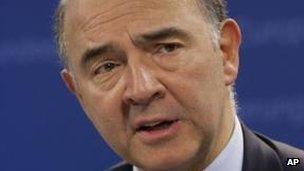France shrugs off loss of top triple-A credit rating
- Published

Pierre Moscovici said the downgrade was motivation to pursue structural reforms
The French government has downplayed the importance of rating agency Moody's decision to deprive the country of its top triple-A credit rating.
Moody's downgraded France's debt from Aaa to Aa1, external, and kept its negative outlook, meaning it could be cut again.
Moody's blamed stalled economic growth, the risk of a Greek euro exit and the risk that France has to contribute to bailing out other eurozone countries.
"Judge us on our results," French Finance Minister Pierre Moscovici said.
Rival ratings agency Standard & Poor's downgraded France from AAA in January. Of the big three agencies, only Fitch still gives France its top rating.
'Second place'
"The rating in no way places a question over the fundamentals of our country's economy - neither the reforms undertaken by the government, nor the quality of the signature on our debt," said Mr Moscovici.
He pointed to the fact that Moody's had only downgraded its rating of the country's long-term debts by one notch, and still gave France's short-term debts its top rating.
The finance minister said Moody's decision reinforced the need for the government to pass a package of economic reforms that is proving unpopular with voters.
The ratings agency's move had not affected sentiment on the financial markets, which still held French debts in high regard, the government claimed.
"France still represents sound value. It is in second place just after Germany," said government spokesperson Najat Vallaud-Belkacem, speaking on French radio.
"Even today, investors lend to France in very favourable conditions. For example, we make short-term borrowings at negative rates, and that is going to continue."
Moody's said the primary reason for the downgrade had been France's "persistent structural economic challenges" and the threats they pose to economic growth and the government's coffers.
"These include the rigidities in labour and services markets, and low levels of innovation, which continue to drive France's gradual but sustained loss of competitiveness and the gradual erosion of its export-oriented industrial base," Moody's said.
Mr Moscovici said the downgrade was motivation to pursue structural reforms.
He also blamed the downgrade on the economic management of previous governments and added that France was still committed to cutting its public deficit to 3% of output next year.
'Time bomb'
Data released last week showed that France had narrowly avoided falling into recession during the third quarter of 2012, registering 0.2% economic growth from the previous quarter.
Over the course of the 12 months, however, the French economy has more or less stagnated.
As well as the latest downgrade, France's new Socialist government has also had to put up with criticism from the financial community and the press, particularly in light of President Francois Hollande's decision to reinstate retirement at 60 for some workers.
The latest edition of the Economist magazine dubbed France "the time bomb at the heart of Europe", external, claiming it had an under-competitive economy and over-dependence on government spending.
French Prime Minister Jean-Marc Ayrault accused the Economist of "excess" saying that "France is not at all impressed".
Nonetheless, the French authorities' reaction to criticism has been notably more sanguine under the current government than under former President Nicolas Sarkozy.
When Standard & Poor's indicated that it intended to become the first rating agency to knock France off the triple-A top spot last December, French policymakers sought to deflect attention to the UK, whose top credit rating was reaffirmed.
The head of the French central bank, Christian Noyer, demanded that the UK should be downgraded first, while the then Finance Minister Francois Baroin poked fun at the UK, saying: "Great Britain is in a very difficult economic situation, a deficit close to the level of Greece, debt equivalent to our own, much higher inflation prospects and growth forecasts well under the eurozone average."